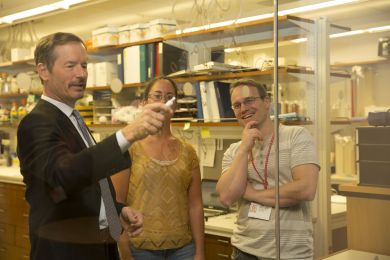A Pathway to Success: Studying signal transduction in cancer and other diseases
Meyer director Lewis Cantley, Ph.D., recently spoke to the People Behind the Science Podcast about his career in science. A summary of the conversation is below. Listen to the full episode here.
Life Outside of Science (02:55)
Though Lew dedicates most of his time to doing and thinking about science, he is also an avid reader. In particular, he enjoys science fiction, mystery, and history books.
The Scientific Side (04:25)
Research in Lew’s lab investigates signal transduction. He has spent most of his career trying to improve our understanding of cell signaling pathways at a molecular level since many diseases involve defects in signaling. In cancer, for example, cells are constantly getting signals to continue growing and dividing, even though this is detrimental to the organism.
A Dose of Motivation (05:35)
“Chance favors only the prepared mind.” By Louis Pasteur
What Got You Hooked on Science? (09:15)
Lew feels like he was a born scientist. As a child, he was incredibly inquisitive, and he loved asking his father questions about how the world worked. His father was worked in the Coast Guard during World War II and was very knowledgeable about navigation and weather. Lew’s questions were often met with detailed scientific explanations that further piqued his interest in science. Chemistry was especially interesting for Lew, and he remembers mixing the contents of his chemistry kit together and marveling as the reactions changed color and the ingredients changed form. He also admits to using his early chemistry knowledge to dabble in making his own rockets and firecrackers as a kid.
The Low Points: Failures and Challenges (25:16)
When Lew and his colleagues first published their findings on the existence of a new enzyme that interacted with cancer-related proteins (PI3K), other labs tried to replicate their work and could not get the same results. These other labs altered the methods of the experiments using detergents to break up lipids, rather than using sonication to form a more membrane-like environment. Lew knew that this was the reason for the contradictory results, but it took years to convince the other scientists in his field. During this time, several papers were published refuting his findings, and he was denied tenure at Harvard University where he was working.
A Shining Success! (28:44)
Despite challenges surrounding the initial discovery of PI3K, this was Lew’s biggest success. One thing that made this discovery particularly exciting was that it stemmed from an unexpected observation. He and his lab were running an unknown protein on a chromatography plate alongside a similar known protein that they suspected would match. They noticed a systematic 1 millimeter difference in the positions of where these two proteins migrated. It was very subtle, but they had identified a completely different protein.
Book Recommendations (03:36)
The Baroque Cycle by Neal Stephenson
Most Treasured Travel (31:25)
One of the most memorable travel experiences for Lew was a trip to india to attend a scientific meeting on cancer. The meeting was held in Agra, and he took a bus from the airport in New Delhi to Agra, and was in awe of all the different modes of transportation on the road. There was everything from carts to camels, all packed together and using the same road. Lew was enchanted by the beauty of monuments like the Taj Mahal and Agra Fort that he was able to visit. The location, and the scientific meeting were fantastic.



